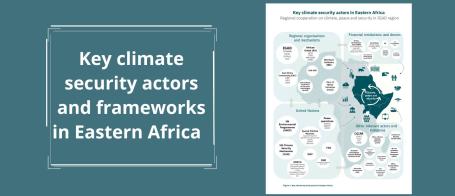Key climate security actors and frameworks in Eastern Africa
Download the full report here.
Eastern Africa has long faced severe climate impacts, particularly in the form of extreme weather events such as droughts, heatwaves, and floods. In countries like South Sudan, Sudan, Somalia and Kenya amongst others, both slow- and fast-onset climate and environmental shocks have compounded existing fragility and increased risks of violent conflict. Countries in the region consistently score low in terms of vulnerability and readiness to respond to climate pressures. The effects of climate change, particularly a decrease in overall precipitation and an increase in rainfall variability, only make existing fragility worse. In 2022, a multi-year episode of drought led to a sixth consecutive failed agricultural season, pushing millions of people across the region at the brink of famine. Since 2020, extreme food and water scarcity have killed an estimated 8.9 million livestock.
Due to this extensive experience and long history of climate vulnerability, Eastern African countries have often spearheaded efforts in preventing and responding to climate-related security risks. Over the years Eastern Africa developed relatively strong institutional capacities, regional mechanisms and expertise around the climate-peace-security nexus. Despite this progress, some key challenges remain.
This mapping exercise was developed by adelphi research under its Weathering Risk initiative, in close collaboration with the Intergovernmental Authority on Development (IGAD), more specifically its Center for Pastoral Areas and Livestock Development (ICPALD). It briefly describes actors, mandates, functions, strategies, and policies that seek to address climate-related security risks in the IGAD region and focuses on institutional bodies, i.e. multilateral and regional organisations, though some key actors outside this space, such as nongovernmental organisations (NGOs) and academic institutions, are also included.
While acknowledging the critical role of national governments and security forces, regional and local authorities, as well as traditional and customary governance systems in addressing climate-related security risks, these were excluded from the scope of this mapping exercise. This report informs ways forward in addressing regional coordination challenges and promotes an effective regional response to climate-related security risks.
In this report Eastern Africa refers to the countries covered by IGAD: Djibouti, Eritrea, Ethiopia, Kenya, Somalia, South Sudan, Sudan and Uganda.
Share on


